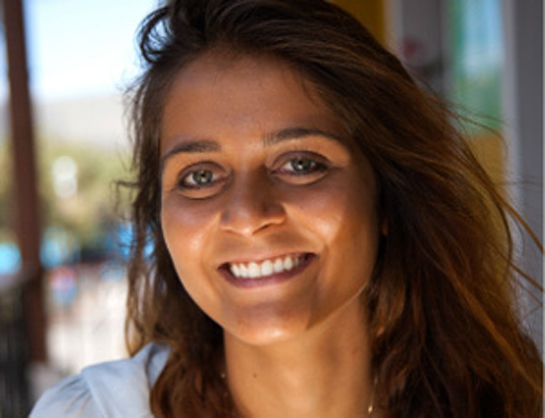The Deep Water Blues: Q&A With Nayantara Jain
Author:
First published in Sanctuary Asia,
Vol. 35
No. 7,
July 2015

Executive Director of Reef Watch Marine Conservation, Nayantara Jain confesses that she has her feet on the sand and her heart in the sea. After spending several years as a scuba diving instructor on both the Lakshadweep and Andaman Islands, Nayantara turned her focus on marine conservation issues.
In a brief email interview with Cara Tejpal, for Sanctuarys August 2015 cover story, she talks about her work with coastal communities in the Andamans.
Tell me a little about the marine conservation work that you do with local communities?
I work with an organization called ReefWatch Marine Conservation, and through this platform I am actively involved with local communities in an effort to protect the ocean and its biodiversity.
One of my favorite programs is our ‘Ocean Art Sundays program. Through this program we engage with all the community children every weekend for a period of four to six months. The aim of this program is to expand the concept of community from the physical aspects of an area, to the coast, the ocean, and its inhabitants as well. We do this through activities that bring into focus the interconnectedness and interdependencies between the ocean, and the land fringing it. We also give the children the opportunity to snorkel, to learn how to scuba dive, to play in mangroves, and watch beautiful international documentaries about the ocean so that they develop a deeppersonal relationship with, and understanding of the ocean. The second part of this program involves empowering the children with the skills and confidence required to positively affect their community. These skills include language, art, different forms of communication, problem solving, and analytical thinking.
Another program I run is documenting the verbal history of old fishermen and residents of Chidiyatapu. These small island communities have seen enormous changes on land as well as in the ocean over the past few decades. Unfortunately there has been a complete lapse in significant long term scientific monitoring in the area, and hence we face what Dr. Jeremy Jackson (Scripps Institution of Oceanography) refers to as a ‘baseline problem. This essentially means that we do not even know what a pristine ecosystem looks like, and therefore as a conservationist there lies the fundamental problem of not knowing what the aim of ones efforts should be! Through recording many interviews with different generations of the fishing community, we are trying to paint a picture of an ideal ecosystem, and understand the changes that have taken place in the Andaman marine world.
Apart from this we are also installing community dustbins in coastal areas (next to schools etc), to try and encourage litter segregation and recycling. We are also doing this to provide a garbage truck service to distant communities that the local municipalities do not cover.
Do you see a change in the attitudes of the communities in Chidiyatapu?
I find that it is very difficult to overcome decades of conditioning and fixed mindsets. It is not really a result you can achieve from a single workshop or forceful engagement. It can only be achieved by working with a community in a sustainable manner, with an aim to help them see and then solve a problem, rather than treating them as the very problem. Only then is it possible to instilla deep-set attitudinal change.
I find it most rewarding to work with children asthey are much more open-minded. The difficulties and obstacles of life and livelihoods have not yet hardened their hearts. They are deeply touched by beauty, moved by cruelty, and driven by positivity. With the young children of fishermen, farmers, and small shopkeepers in Chidiyatapu, I see an enormous change in attitudes. They have initiatedbeach clean-ups, and are now more aware of litter. Having gone diving in the ocean they are also now amazed by coral reefs. They know that coral reefs cover only 0.2% of the ocean, and they now feel a sense of pride to be living in such a biologically diverse environment. I also sense a shift in their perspectives towards proprietary stewardship i.e; a desire to protect their personal heritage. This is so heartwarming and motivating.
Finally, do you feel positive about marine conservation? And if so, why?
I would not do the work that I do if I did not believe without even the slightest doubt in mind, that we as a global human community can come together and halt the rapid exploitation and complete decimation of the ocean and its animals. I believe in the kindness, charity, and generosity of the human spirit. I however equally and perhaps more appealing to a cynical mind, believe in self-preservation. At the end of the day caring for the ocean is caring for ourselves. We need the food the ocean provides, the oxygen created by plankton, and the medicine derived from artificially creating compounds that are found naturally on the coral reef. We will protect sharks, whales, and reefs, because we need them. We have caused a lot of destruction in the sea, but it is driven by ignorance, not by malice. The largest part of my work with ReefWatch is to address the ignorance regarding oceans and marine life. At present, this work is mainly in the Andaman Islands and in Mumbai. We are active on social network forums as well, and try to spread awareness there too. As the awareness grows, I hope to find the financial support and moral mandate to start doing this work across the 8000+ km. coast of our very populous country!
Read more: Shark Gods
First published in: Sanctuary Asia, Vol. XXXV No. 8, August 2015.


